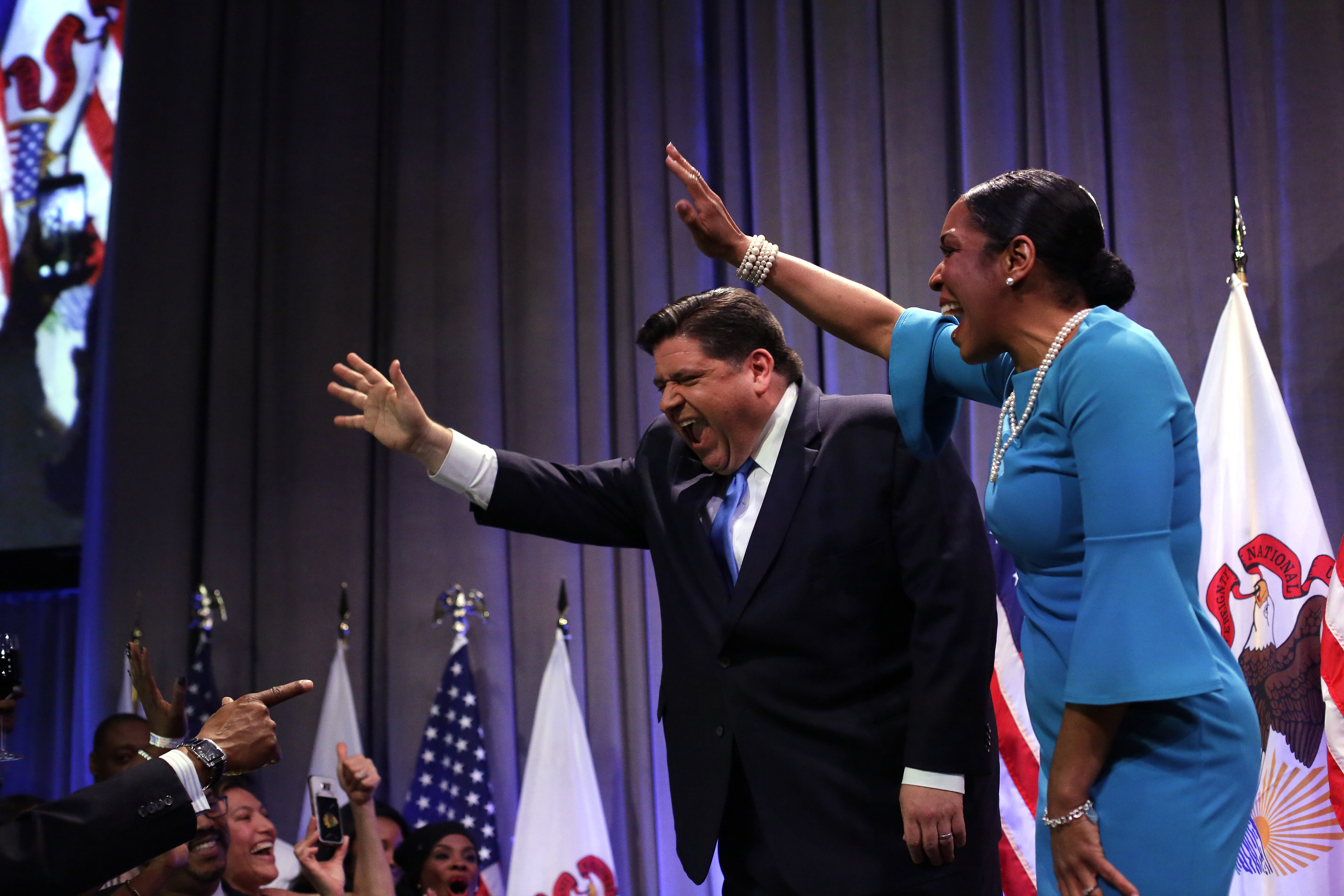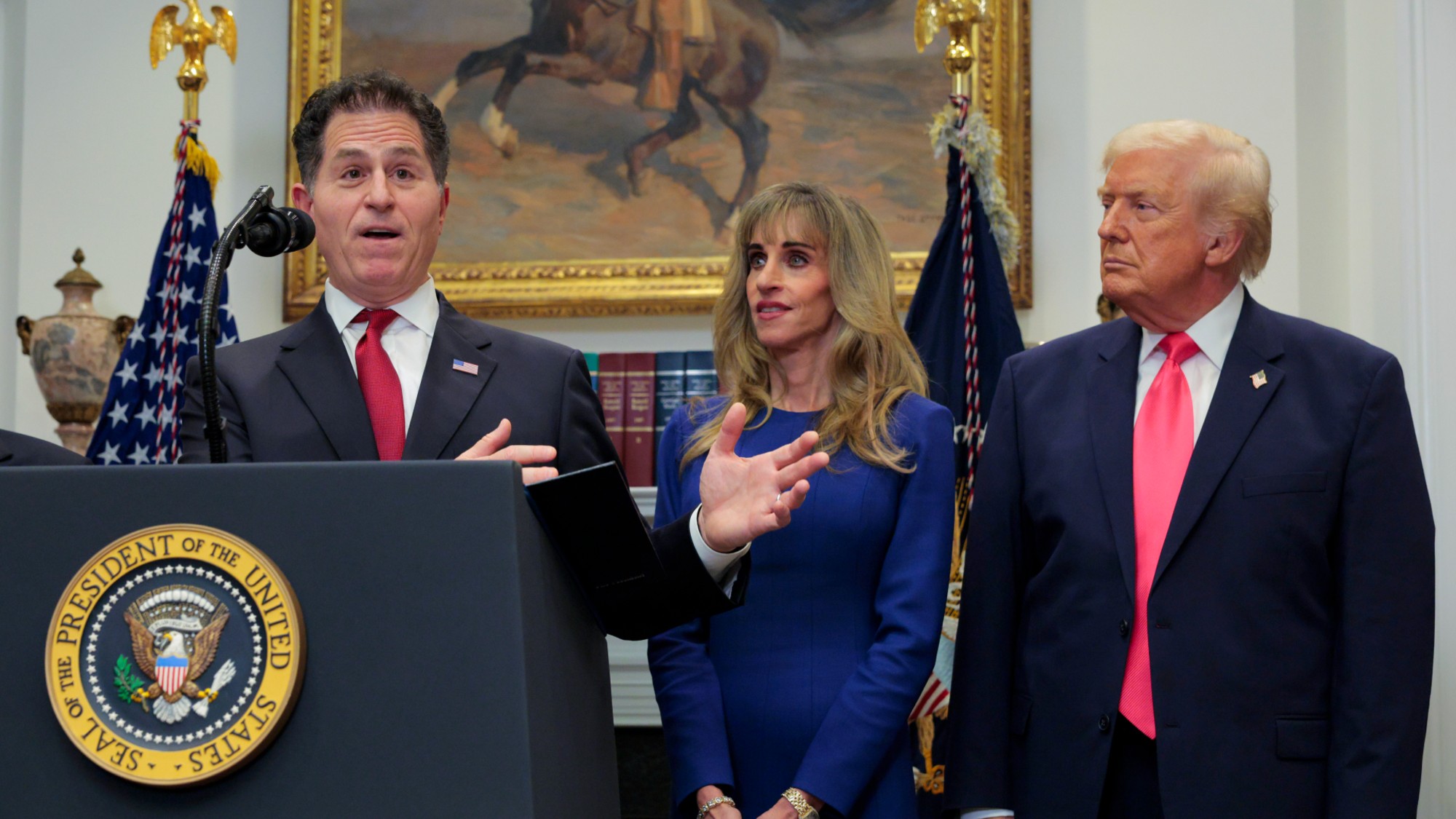The lessons of Illinois' dispiriting primaries
The status quo prevailed. But only for now.


Tuesday's fiercely fought Democratic and Republican primaries in Illinois proved to be tough for underdogs and great for the status quo.
The state's embattled Republican governor, Bruce Rauner, narrowly avoided the embarrassment of losing to an unhinged Trumpist challenger named Jeanne Ives, mostly by pouring millions of his own dollars into the race. On the Democratic side, a billionaire named J.B. Pritzker basically bought his party's nomination with the backing of the state's party elite. And the infamous Chicago political machine delivered a nail-biter win to conservative Democratic Rep. Dan Lipinski, who white-knuckled a spirited challenge from progressive Marie Newman.
These races had drawn some national attention for their potential to showcase newfound energy on the left as part of a broader anti-incumbent, anti-establishment fervor, and for the potential embarrassment of a sitting and deeply unpopular Republican governor getting unseated in his own party's primary. Party elites in Springfield and D.C. are probably relieved at these results.
The Week
Escape your echo chamber. Get the facts behind the news, plus analysis from multiple perspectives.

Sign up for The Week's Free Newsletters
From our morning news briefing to a weekly Good News Newsletter, get the best of The Week delivered directly to your inbox.
From our morning news briefing to a weekly Good News Newsletter, get the best of The Week delivered directly to your inbox.
They shouldn't be.
The topline numbers obscure major shifts that are likely to roil Illinois and national politics for years to come. The bottom line is that the state's Democrats and Republicans are headed in opposite directions — an ascendant progressive left no longer afraid of challenging the state's Democratic insiders, and a Republican Party falling inexorably into the hands of white nationalist extremists. For better or worse, a state that has seemed stubbornly stuck in a bygone era of patronage and machine politics is careening headlong into an era of polarization that closely mirrors the national predicament.
While Rauner is no moderate, by today's up-is-down standards he counts as one of the more reasonable Republicans in the state. But his salvation is likely to be brief, because he will be an overwhelming underdog against Pritzker in the fall. In addition to alienating a majority of Illinoisans with his intractable refusal to negotiate or compromise on the state budget, the governor drew unwanted scrutiny from the conservative intelligentsia when the National Review declared him the "worst Republican governor in America."
That designation seemed somewhat uncharitable, since Rauner faces perhaps the most hostile legislature of any governor in the country and has basically zero policy achievements to speak of except those that were literally forced on him by overwhelming Democratic majorities. If anything, Rauner held the party's inflexible line as best he could. It didn't help that he had angered downstate Republicans by signing an abortion rights bill last September in what was probably a hopeless attempt to salvage his general election prospects.
A free daily email with the biggest news stories of the day – and the best features from TheWeek.com
It obviously didn't work. And the strong showing for Ives, Rauner's Trumpist challenger, should terrify moderate Republicans interested in ever winning a statewide race in Illinois again, as well as Democrats who are confident that the chaos of the Trump era will witness the final vanquishing of fact-averse white nationalism. An unapologetic zealot, Ives is best known to voters for okaying this genuinely despicable ad that mocks trans people and others in the most horrifying possible ways. The fact that she has appeal to a significant sector of the Republican base in Illinois of all places strongly suggests that this awful form of politics will survive the president and remain a threat to American democracy for many years to come.
For progressive Democrats, it was generally a disappointing night. The resurgent left wing of the Democratic Party invested heavily in the state's third congressional district. There, newcomer Marie Newman came achingly close to unseating Dan Lipinski, 51-49. He seems an unlikely candidate to survive another primary cycle, but progressive activists were still bitterly disappointed by this result after polls showed a toss-up.
Still, Lipinski's decline is indicative of the waning strength of conservative Democrats nationwide. The last time Lipinski faced a primary challenge was in 2012, when he defeated Farah Baqai with over 87 percent of the vote, despite voting against the Affordable Care Act and the DREAM Act. He ran unopposed in the primary in 2014 and had no challenger in either the primary or the general election in 2016. In other words, Lipinski should have been the very definition of a shoo-in. But despite assistance from the national party, including support from the Democratic Congressional Campaign Committee and strong backing from Nancy Pelosi and House leadership, Lipinski barely squeaked by.
While the party probably needs to tolerate candidates who are personally if not legally opposed to abortion in certain districts, like the one Conor Lamb just won in Pennsylvania, IL-3, which Hillary Clinton carried by more than 15 points, is not one of those places. Lipinski has long been a target of progressive activists, but it wasn't until last year that the disjuncture between his voting record and his constituents' desires resulted in actual grassroots energy against him in his own district. That energy isn't going away.
The progressive groundswell was also felt in the state's Democratic gubernatorial primary. Investment banker J.B. Pritzker, scion of one of the country's richest families, had spent the past year dropping over $69 million of his own money into the race to face off against Rauner. State Democrats hoping to capture supermajorities in the state House and Senate, and thus amend the state constitution to allow for progressive taxation, made an early calculation that J.B.'s billions could match Rauner's money at the top of the ballot and also allow the party to distribute the rest of its money on the other races.
Yet victory remained stubbornly out of reach for Pritzker throughout the campaign. He never could get his polling numbers above 40 percent, and in January the campaign of state Sen. Daniel Biss began to dig into Pritzker's lead despite the frontrunner's overwhelming cash advantage. Biss, a former University of Chicago math professor, became the default progressive darling in the race and scored endorsements from prominent progressive groups like MoveOn, Our Revolution, and Reclaim Chicago. While the race was sparsely polled, there was a clear uptick in support for Biss after the new year. An election shocker was not out of the question. But that upset never materialized, and Pritzker carried the race going away.
Now, Illinois voters will be treated to the spectacle of two unloved billionaires blanketing the state in enough campaign cash to buy the Cubs 10 times over. But if last night is any indication, their style of politics is living on borrowed time.
David Faris is a professor of political science at Roosevelt University and the author of "It's Time to Fight Dirty: How Democrats Can Build a Lasting Majority in American Politics." He's a frequent contributor to Newsweek and Slate, and his work has appeared in The Washington Post, The New Republic and The Nation, among others.
-
 Can Mike Johnson keep his job?
Can Mike Johnson keep his job?Today's Big Question GOP women come after the House leader
-
 A postapocalyptic trip to Sin City, a peek inside Taylor Swift’s “Eras” tour, and an explicit hockey romance in December TV
A postapocalyptic trip to Sin City, a peek inside Taylor Swift’s “Eras” tour, and an explicit hockey romance in December TVthe week recommends This month’s new television releases include ‘Fallout,’ ‘Taylor Swift: The End Of An Era’ and ‘Heated Rivalry’
-
 ‘These accounts clearly are designed as a capitalist alternative’
‘These accounts clearly are designed as a capitalist alternative’Instant Opinion Opinion, comment and editorials of the day
-
 Has Zohran Mamdani shown the Democrats how to win again?
Has Zohran Mamdani shown the Democrats how to win again?Today’s Big Question New York City mayoral election touted as victory for left-wing populists but moderate centrist wins elsewhere present more complex path for Democratic Party
-
 Millions turn out for anti-Trump ‘No Kings’ rallies
Millions turn out for anti-Trump ‘No Kings’ ralliesSpeed Read An estimated 7 million people participated, 2 million more than at the first ‘No Kings’ protest in June
-
 Ghislaine Maxwell: angling for a Trump pardon
Ghislaine Maxwell: angling for a Trump pardonTalking Point Convicted sex trafficker's testimony could shed new light on president's links to Jeffrey Epstein
-
 The last words and final moments of 40 presidents
The last words and final moments of 40 presidentsThe Explainer Some are eloquent quotes worthy of the holders of the highest office in the nation, and others... aren't
-
 The JFK files: the truth at last?
The JFK files: the truth at last?In The Spotlight More than 64,000 previously classified documents relating the 1963 assassination of John F. Kennedy have been released by the Trump administration
-
 'Seriously, not literally': how should the world take Donald Trump?
'Seriously, not literally': how should the world take Donald Trump?Today's big question White House rhetoric and reality look likely to become increasingly blurred
-
 Will Trump's 'madman' strategy pay off?
Will Trump's 'madman' strategy pay off?Today's Big Question Incoming US president likes to seem unpredictable but, this time round, world leaders could be wise to his playbook
-
 Democrats vs. Republicans: who are US billionaires backing?
Democrats vs. Republicans: who are US billionaires backing?The Explainer Younger tech titans join 'boys' club throwing money and support' behind President Trump, while older plutocrats quietly rebuke new administration
